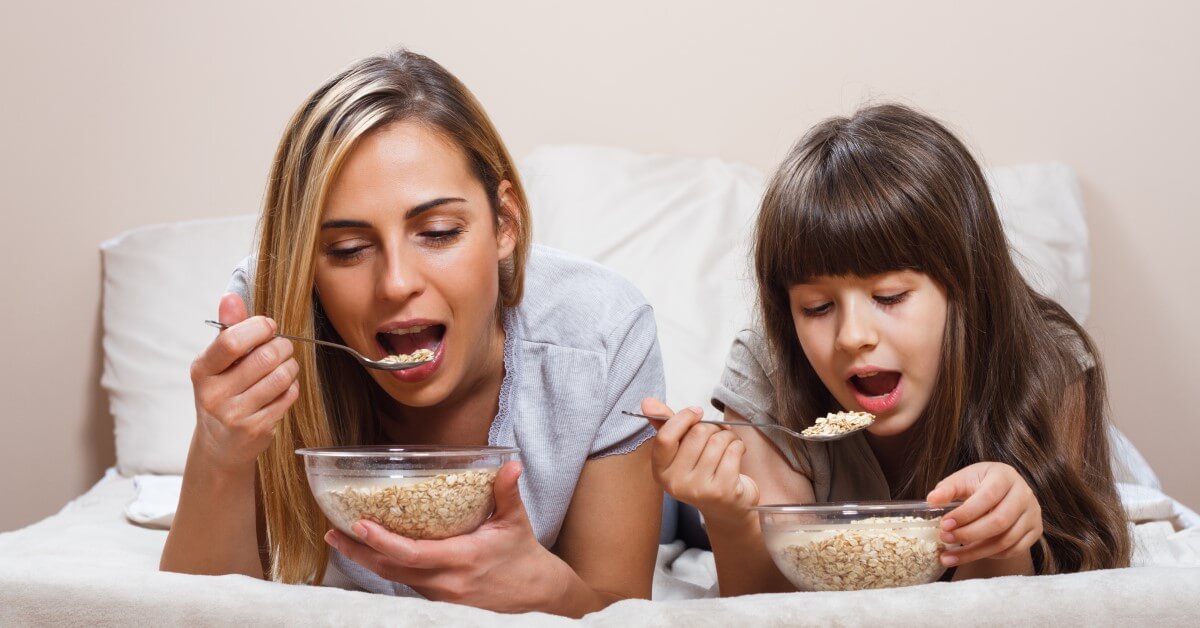Overview
Nutrition and sleep are inexorably linked. Foods such as cherries, walnuts, and milk can positively impact rest.[1] In contrast, others, such as caffeine-containing beverages and prepared foods that are high in fat, have the opposite effect if consumed close to bedtime.
It’s noteworthy that the food manufacturing industry is clueing into this relationship more with a new potential market some have dubbed “the 4th meal,” in addition to breakfast, lunch, and dinner, and is referred to as a sleep-inducing pre-bedtime meal.
But are food products marketed as beneficial for sleep the real deal or a food industry attempt at producing a new income stream?
If you’ve ever considered trying a new cereal that has hit the shelves claiming to help with sleep, read on.
Food for the Sleepless
We know that some foods can help us get a good night’s rest. Their effects can be directly measured in cases such as the foods mentioned earlier, or there can even be a secondary effect on sleep in foods that help with gut health.
Considering this, given the right ingredients, a product like sleep cereal could help with sleep. Post Consumer Brands, makers of cereals such as “Raisin Bran” and “Grape-Nuts” would certainly like you to think so.
They have introduced a cereal called “Sweet Dreams” that claims to support good sleep routines with vitamins and minerals that help with melatonin production. But does the science behind food and sleep support these claims?
Hitching a Ride with Good Intentions
The problem with any processed food, such as breakfast cereal, is that it can be a lot of goodness with a lot of unwanted stuff hitching a ride. Sleep cereal is such a product.
Although the cereal does contain some vitamins and minerals that can, in fact, aid in melatonin production, it becomes questionable when one starts to factor in the amount of added sugar (12 grams!). Worse, the sugar sources are corn syrup, molasses, and cane syrup. Studies have shown that highly refined sugars like those adversely affect sleep quality.[2]
Furthermore, the cereal itself is composed of grains which are carbohydrates. These can cause spikes in your blood sugar levels before bedtime, which has been shown to increase alertness, stimulating your brain and preventing you from falling asleep.[3]
It’s advisable to limit your intake of carbohydrates, especially before bedtime.
There Are Better Options Available
From a nutritional perspective, sleep cereals don’t cut it (yet) for sleep. If you want to improve your sleep quality using food – it can certainly be done, but your best bet is to look for foods proven by scientific studies to help with this goal.
Clinically proven foods that help obtain that crucial good night’s rest are whole, unprocessed, nutritious, and free of any other ingredients that could work the opposite effect.
But if you are still curious – by all means, give the sleep cereal a try. Just make sure it’s not too close to bedtime.
References:
- Zeng, Y., Yang, J., Du, J., Pu, X., Yang, X., Yang, S., & Yang, T. (2014). Strategies of Functional Foods Promote Sleep in Human Being. Current signal transduction therapy, 9(3), 148–155. https://doi.org/10.2174/1574362410666150205165504
- Alahmary, S. A., Alduhaylib, S. A., Alkawii, H. A., Olwani, M. M., Shablan, R. A., Ayoub, H. M., Purayidathil, T. S., Abuzaid, O. I., & Khattab, R. Y. (2019). Relationship Between Added Sugar Intake and Sleep Quality Among University Students: A Cross-sectional Study. American journal of lifestyle medicine, 16(1), 122–129. https://doi.org/10.1177/1559827619870476
- St-Onge, M. P., Mikic, A., & Pietrolungo, C. E. (2016). Effects of Diet on Sleep Quality. Advances in nutrition (Bethesda, Md.), 7(5), 938–949. https://doi.org/10.3945/an.116.012336.







